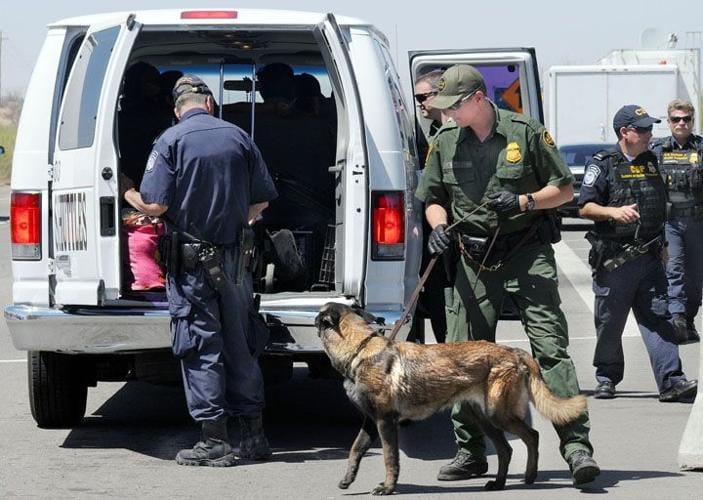Warrantless Searches by U.S. Border Patrol

When I drive home from Tubac (a small artist/shopping community 45 miles south of Tucson), I have to pass through a permanent checkpoint where Border Patrol agents are allowed to ask anyone basic immigration questions without having suspicion. I’ve never had an unpleasant experience, but I’m old and white, and have a disarming smile. But with all the deportations and apparent kidnappings being flashed across news sources today, I thought it was time to find out what the Border Patrol was and who they have jurisdiction over. Spoiler alert…it’s a little unnerving.
The U.S. Border Patrol (USBP) began in 1924 as a small force patrolling remote desert and river crossings. A century later, it is the nation’s largest uniformed federal police agency, responsible not only for the land and coastal borders but also for vast swaths of territory inside the United States. If you drive from Seattle to Portland, ride a bus from Buffalo to Cleveland, or even hop on a train from Tucson to Phoenix, you may be surprised to learn that you’re traveling through a legal gray area where Border Patrol agents can stop and question you—no warrant required.
Roughly two-thirds of the U.S. population lives in this “border zone,” a 100-mile swath around the country’s land and coastal frontiers where the ordinary Fourth-Amendment rules about searches and seizures are dramatically relaxed.
So, what is the Border Patrol for?
Officially, agents are there to “protect the American people, safeguard our borders, and enhance the nation’s economic prosperity.” The Border Patrol’s original job—watching the line in the sand—has ballooned into a police force operating deep inside the country with powers most cops don’t have. Whether that trade-off feels worth it depends on how comfortable you are handing a stranger your unlocked phone—or getting questioned about your citizenship while you sit at your favorite coffee shop in New York City.
Why is this spooky for you and me?
The “border” is closer than you think. That hundred-mile band wraps around the entire country.
Your phone is fair game. 47,000 devices were searched in 2024. Granted, that is only 0.01 percent of all travelers, but that’s quadruple the number from a decade ago, and agents can keep copies of your data if they find “law-enforcement value.”
Judges disagree on the brakes. One court says agents need reasonable suspicion for a deep-dive phone search, another says nope, and the Supreme Court hasn’t weighed in. Translation: your privacy rights change with your ZIP code.
Profiling complaints don’t go away. Civil-rights groups document cases where U.S. citizens—often Black, Brown, or just speaking the “wrong” language—get pulled off buses for extra grilling.
Normal police rules don’t always apply. Outside the zone, officers need a warrant or at least probable cause to search your car. Inside, a Border Patrol agent can poke around based on a dog’s sniff or a “hunch” at a checkpoint.
What you can actually do
Know the zone. If you’re within 100 miles of any coast or international line, assume agents have expanded powers. So play nice, but lock your devices. A strong passcode adds friction; they can still seize the phone, but a forensic search takes time and usually higher approval.
I have been told by native Arizonans to ask, “Am I free to leave?” At interior checkpoints, they can ask quick immigration questions, but they need cause to hold you longer. Remember, cause can be based on the agent’s hunch, so keep the snark at bay.

Member discussion